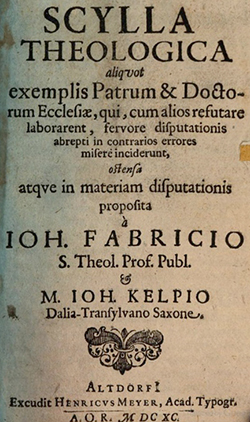
Articles
Kelpius in the Digital Age

As most of us know, very little primary source material has been readily available to us concerning the philosophy and attitudes that motivated Johannes Kelpius and affected his decisions and his actions. Kelpius Society member, Cathy Michael, is undertaking a project that she hopes will provide access to Kelpius’s scholarship. Cathy, who is Communications and Legal Studies Librarian at Ithaca College, has requested that European libraries digitize copies of texts by Kelpius from the time when he was a college student at the University of Altdorf.
Before digitization, scholars would need to travel to Europe and requests to view such texts in person. Efforts to digitize historic texts have been a boon to scholarship. Researchers can now quickly discover texts using WorldCat (a joint catalog of bibliographic data shared between libraries), HathiTrust Digital Library (a partnership of research libraries), and Google Books. In addition to that, many European libraries have digital collections on their websites. Requesting a text be digitized typically entails creating an account and paying a fee for processing. Cathy’s request for the Scylla Theologica from the Bavarian State Library was denied last year as they intended to add it to Google Books; there was no cost, but she was unaware that the copy was available until searching for free PDFs recently. This discovery inspired her to request the Inquisitio from the Tuebingen University Library. After payment, the library created a scanned copy in an expeditious manner. The copy is now accessible via their digital site; they included a copyright statement that indicates that users should request permission before republishing the text.
Here are the texts to explore:
- Scylla theologica, aliquot exemplis Patrum et Doctorum ecclesiae ... ostensa [The Theological Scylla]. Altdorfium, 1690. co-written with Magister Johannes Fabricius (from the Bavarian State Library / Die Bayerische Staatsbibliothek) http://www.worldcat.org/oclc/165448107 ; added to Google Books: http://books.google.com/books?id=V3ZOAAAAcAAJ&pg=PP2#v=onepage&q&f=false
- Ethicus ethnicus ineptus christianae juventutis hodegus [A Pagan Moral Philosopher is an Unfit Guide for Christian Youth]. Altdorfii : literis H. Meyeri, 1690 [edited by or co-written with] Johann Erich Mezger (from the National Library of France / La Bibliothèque nationale de France (BnF)) http://catalogue.bnf.fr/ark:/12148/cb30939967g/PUBLIC (request is currently unfulfilled)
- Inquisitio an ethicus ethnicus aptus sit Christianae juventutis hodegus? [Inquiry Whether a Pagan Moral Philosopher can be a Fit Guide for Christian Youth], Altdorfii, 1690. [edited by or co-written with] Balthasar Blosius (from the Tuebingen University Library / Universitätsbibliothek Tübingen) http://idb.ub.uni-tuebingen.de/diglit/Hf180_2
- Amoenitates Theologicae varii & selecti argumenti...Helmestadii : Hammius, 1699. Kelpius is a contributor; this reproduceds his Scylla theologica http://diglib.hab.de/drucke/xd-8f-1347/start.htm (original from Wolfenbüttel : Herzog August Bibliothek, 2011); also in Google Books (original from University of Lausanne) http://books.google.com/books?id=Yp0UAAAAQAAJ&source=gbs_navlinks_s Note: if you click on Fabricius’s name in Google Books, there are a variety of texts of his that have been digitized. Cathy did not personally request that this copy be digitized.
Although Kelpius' views on theology may have changed when he became involved with Magister Johann Zimmerman and the Chapter of Perfection and after his arrival in America, these documents can give us a window into a part of the vast intellectual capabilities Kelpius mastered as a young scholar. Historians have noted that the fact that he co-authored a work with his mentor, Fabricius, is atypical and an indicator of the strength of his scholarship. The works demonstrate his knowledge of theology and are also evidence of his language skills that earned him the title of Master.
The Pietists were interested in issues of Christian education. It was a goal of the Kelpius Community to provide a Christian education for the children of Germantown. The Ethicus Ethnicus provides evidence of what Kelpius’s educational philosophy was at the time. It inquires whether Christian youths should read works by pagan philosophers (such as Aristotle) . Although this thesis had been cited by historians, there have been no summaries of what Kelpius’s answer to that question may be. However, the copy in La Bibliothèque nationale de France does not pose a question of whether Aristotle should be taught to Christian youths; it states the thesis: that Aristotle is an unfit guide. Since the BnF copy is not in receipt, the two similar texts cannot yet be compared.
As libraries digitize more and more of their collections, we can more clearly establish the environment in which Kelpius was writing. Additional digitized works by Fabricius are also obtainable through Google Books. Fabricius’s Amoenitates Theologicae Varii is a compilation of dissertations and includes the Scylla Theologica (p. 10 of the digital copy lists nine dissertation titles). This additional imprint can be compared by the stand-alone copy and used to fill in gaps where there are torn pages that omit text. The compilation places Kelpius’s theses in the context of his contemporaries. The titles, taken together, exemplify the concerns of academic study and theology following the Thirty Years War.
All these documents were written and published in Latin, that being the common language of academia at the time. Cathy has asked Robert Ziomkowski, a Professor of Latin at Ithaca College to translate the titles, above. Although he doesn't have the time to translate the texts in full, he would consider helping if there were other experts in Latin to assist. Another option is to apply for a grant so that the Society might hire a paid translator. Anyone interested in collaborating on a translation or working on a grant should contact The Kelpius Society.
